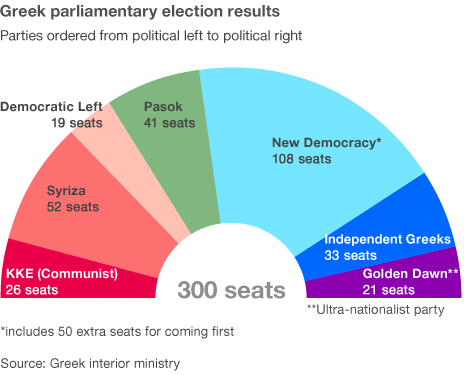Evangelos Venizelos, leader of Greek Socialist Pasok party, has announced that the country is set to go to the polls again after days of coalition talks failed to produce agreement on a new government.
A final round of talks on Tuesday morning broke up without a deal.
In elections on 6 May, a majority of Greek voters backed parties opposed to austerity plans demanded by the EU and IMF in return for two bailouts.
Greek president Karolos Papoulias will appoint a caretaker government on Wednesday.
Karolos Papoulias will meet all political leaders at 13:00 local time on Wednesday to put in place an interim government until the new vote, which is expected to take place on 10 or 17 June.
“Unfortunately, the country is heading again toward elections,” Evangelos Venizelos told reporters after the talks on Tuesday.
The euro fell sharply on the news, tumbling from $1.2842 to $1.2771 shortly after 13:15 GMT – its lowest value since 18 January.
Greek shares also fell before recovering slightly.

The leader of the right-wing Independent Greeks Party, Panos Kammenos, said: “The pro-bailout parties would prefer a government which will further torment the Greek nation, rather than finding a solution. They have offered a proposal that is too rigid for me to accept.”
European leaders say that they will cut off funding for Greece if it rejects the bailout agreed in March.
This would mean effective bankruptcy for Greece and its all but certain exit from the European single currency, analysts say.
German Finance Minister Wolfgang Schaeuble again ruled out amending the bailout agreement.
“The people in Greece must know that what we have agreed for Greece and have set in train is an entirely unusual effort,” he said after talks in Brussels on Tuesday.
Polls suggest the leftist Syriza bloc, which came second in the 6 May vote and rejects all further cutbacks, could become the largest party after a new election.
Syriza wants to renegotiate the bailout package but also wants to keep Greece in the euro.
Greece must also decide whether to redeem an outstanding bond worth 436 million Euros ($558.67 million) which matures on Tuesday.
A Greek official, speaking on condition of anonymity, told the Associated Press that Athens would pay off the debt on schedule, thereby avoiding a default.
The chairman of the eurozone group of finance minister, Jean-Claude Juncker of Luxembourg, said on Monday he wanted Greece to remain in the single currency but warned that Athens must keep to its commitments.
Pasok and New Democracy, which signed up to the bailouts and had previously dominated Greek politics for decades, saw their combined share of the vote drop from about 77% to about 33% on 6 May.
